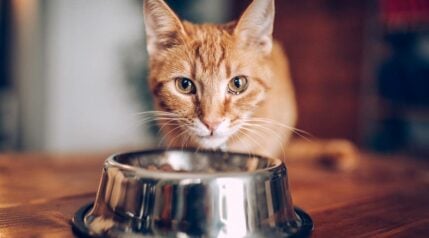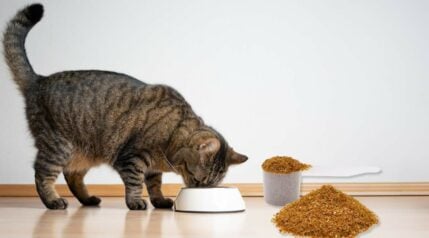When you purchase through links on our site, we may earn a commission. Here’s how it works.
It is a well-known fact that cats are curious creatures, especially when it comes to what their humans are eating. It does not really matter what we have on our plates. Those sneaky kitties will come sniffing and may even try to swipe a bite or two. Cat owners are often curious about what human foods, including fruits, might be safe for their pets. For people who eat a lot of berries, the question of whether this fruit is safe for their purr babies often arises. One berry that owners often wonder if cats can eat safely is raspberries.
Knowing what human foods are safe for cats is a big part of feline ownership. It might seem that foods like fruits and vegetables, which are considered healthy for humans, would be safe for felines. Unfortunately, this is not always the case. The feline body and digestive system are built differently than ours. They have different nutritional needs, so it is important to use caution when introducing any new food to them.
As most cat owners will agree, it is almost unavoidable that your kitty will get a bite or two of food. They are wonderful thieves, so they may steal them right from your table or plate, will happily pounce on snacks and scraps you drop on the floor, or may convince you to give them a treat based on those big, cute eyes and expression. In this quick guide, we discuss if cats can eat raspberries if they are safe and some treat alternatives, as well as tackle some frequently asked questions.
Can Cats Eat Raspberries?
The simple answer to this question is yes. Cats can eat raspberries. However, this does not mean that this fruit, or any other berries, are something purr babies should indulge in regularly or in large amounts. Fruit is not part of their natural diet and can be hard to digest. As with any other human food, it is best to proceed with caution and only ever feed your kitty small amounts of human food. Always do your research, and make sure food is safe before intentionally feeding it to them. If your cat eats something by accident, do not panic. Stay calm, and always contact your veterinarian if you are worried. They are happy to help and would much rather you call than wait until something becomes an emergency.
Are Raspberries Safe For Cats
In very small amounts, these tangy berries are safe for felines. This means that if your cat manages to swipe a berry or two from your plate, he will be fine. It does not mean that your cat should consume them at every meal or that you should share a snack with them every time you eat them.
Raspberries, along with several other kinds of berries, including strawberries, are a natural source of xylitol. Xylitol is a natural sugar alternative that is used in many human foods. It is also highly toxic to felines in large quantities. The amount contained in just a berry or two is not enough to cause harm. However, regular consumption is not advised.
A cat eating raspberries, even one that overindulges, is not likely to develop an extremely toxic reaction but will not be comfortable. Kitties who ingest too much may experience stomach pain, diarrhea, constipation, and vomiting, among other symptoms. Additionally, xylitol can play a role in the development of hypoglycemia and liver disease.
Felines are obligate carnivores. This means that they must eat meat. While commercial cat foods do contain other ingredients like fruits, vegetables, and grains, they should be based on high-quality animal proteins. Feline digestive systems do not handle plant material as well as ours. So, one or two berries occasionally are okay, but in large quantities, they can become a digestive problem. Your cat may have trouble breaking them down and can experience several days of stomach upset and pain before everything is worked out of their system.
Are Raspberries Good For Cats?
Raspberries have many health benefits for humans. Along with being high in healthy fiber, they contain manganese, which boosts skin and bone health, as well as works to regulate blood sugar. Potassium helps the heart stay healthy and function and can help lower blood pressure. These berries are also high in Omega-3 fatty acids, which help with heart health and work to prevent strokes. These fruits are low in fat and sugar but high in antioxidants. They are a great source of Vitamins A, C, E, K, and B vitamins, along with Potassium and manganese. These are sweet, juicy, and very healthy treats for humans.
Raspberries have fewer health benefits for felines, as they are hard to digest and not part of their natural diet. However, they can boost fiber, vitamins, and antioxidants. They are also a good source of moisture. There are better and healthier treat options to give a cat if owners are worried about digestive fiber.
Do Cats Like Raspberries?

This is a hard question to answer. Felines do not have the same taste receptors as humans and do not taste sweet flavors. If they do like raspberries, it is not because of the flavor. Some purr babies may have an interest in them due to the texture or simply because it is something they see their humans eating. There is always the possibility that an individual kitty may develop a taste for this specific berry.
Felines may be attracted to the smell of the berries, as it is something different and fresh. Additionally, they are attracted to small, roundish objects they can bat and chase around. So, while we cannot definitively answer whether our purr babies like the taste of these tangy berries, we do know there are many reasons why they might.
What Should I Do If My Cat Ate Too Many Raspberries?
If you suspect your cat ate a large quantity of the fruit, you may see some signs of discomfort and pain. Make sure to monitor them in case things get worse. Remove access to any more berries right away, and get your cat in a safe place where you can observe what is happening. Look out for signs and symptoms of your kitty in distress. Call your vet as soon as you can. If your purr baby seems to be in great pain or distress, you will need to get to the nearest emergency vet as soon as possible.
While raspberries are not considered toxic because they naturally contain xylitol, they can be harmful in larger doses. Never try to make your kitty vomit or try to remove things from their throat or mouth. There is no way to safely do this. It is best left to the medical professionals.
Are There Any Fruits Safe For Cats?
There are several fruits that are safe for felines. Keep in mind that fruit is not part of a cat’s natural diet and should not make up a large part of their nutrition. Occasional treats and tastes are okay, but unless directed to do so by your vet, your kitty should not make a habit of eating fruit regularly. Some fruits felines can safely eat, in moderation, include:
- Bananas
- Pineapple
- Guava
- Blueberries
- Watermelon
- Cucumbers
- Apples
- Mango
- Dragon Fruit
Only ever feed a cat fruit in moderation. Stick to fresh fruit that has no other ingredients. Always be careful, as some fruits, like tomatoes, have parts that can be very toxic to felines.
Frequently Asked Questions
Can cats eat fresh raspberries?
Fresh fruits are the best kind to feed your cat. Wash them thoroughly and cut them into bite-sized pieces if they are large. Always inspect the food for any bugs, mold, or other potential hazards. Stick to berries that have no added ingredient. Your kitty should stick to fresh raspberries and stay away from raspberry dishes like Raspberry yogurt. While this is very healthy for humans, for felines, dairy is not as easy to digest.
Should cats eat raspberry jam?
Felines should not eat any kind of raspberry jam, jelly, preserves, or fillings. They should only ever eat fruit that has no other added ingredients. Jams and other similar foods contain high levels of sugar, as well as artificial preservatives and other ingredients. They can also contain high enough levels of xylitol to be toxic to your pet.
Can cats eat frozen raspberries?
Yes, felines can eat frozen berries. Make sure they are not large or hard enough to be a choking hazard. Do not give kitties fruit that has added sugar or other preservatives. You can allow the berries to thaw partially so your kitty can bite through them more easily and reduce the chances of choking. Felines should not be fed raspberry ice cream, frozen yogurt, or any kind of frozen fruit with added whipped cream or sugar.
What should cats eat?
Felines need a diet that is high in good-quality animal proteins. Stick to foods that do not use fillers, artificial flavors, and additives. A named animal protein should always be the first ingredient. Look for foods that are appropriate for the life stage your kitty is in. You can look to the Association of American Feed Control Officials (AAFCO) for guidelines about what should be included in your pet’s food. Look for labels that have this info on the label, as well as those that say, “complete nutrition.” Nutrition is a key element in your fur baby’s health and development. This is not an area to try to save money and go with a lower-quality option. Purchase the best food you can afford, and always read the labels.
Final Thoughts
Cats love to investigate what their owners are eating. It is not unusual for them to sneak a bite or two of people’s food. Owners are often concerned about their cats eating human foods like raspberries. The good news is that this fruit, in moderation, is safe for them to eat. Felines should never be fed a diet high in plant materials like fruit, but some here and there can be a healthy, tasty treat. Make sure to observe your cat, and only ever feed felines fruit that has been prepared for them. These berries are not suitable for an everyday treat, but they can occasionally be a nice boost of moisture and flavor for your purr baby. Make sure to always discuss any dietary concerns you have with your vet rather than supplementing your pet’s diet with foods like fruit.




